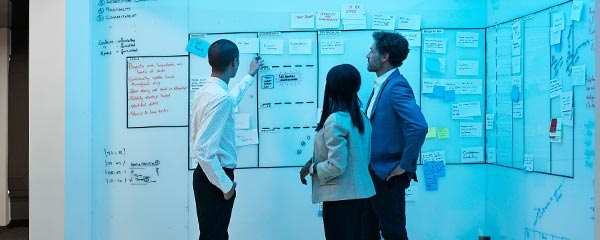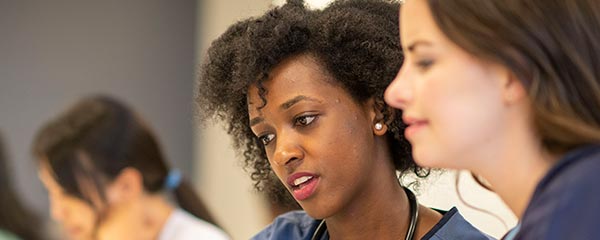Story Highlights
- Lowenstein and his team leaned into their strengths when coronavirus hit
- Know when to lead and when to follow
- Mayo's mission inspires Lowenstein and his team
Mayo Clinic's mission is to "inspire hope and contribute to health and wellbeing by providing the best care to every patient through integrated clinical practice, education and research."
James Lowenstein is the Division Director of Gastrointestinology and Infectious Disease at Mayo Clinic Laboratories -- a commercial entity of Mayo Clinic.
Since the outbreak of the novel coronavirus, Lowenstein and his team of 26 Clinical Specialty Representatives and three Regional Directors of Sales have been focused on providing Mayo's COVID-19 testing resources and "contributing to health and wellbeing by providing the best care to every patient." Over 20 million people worldwide have now been diagnosed with COVID-19. Mayo Clinic Lab Vice President of Sales John Heywood shares with Gallup, "The mission of Mayo has never been more critical; our leadership team was poised and ready to meet this challenge." As part of Heywood's direct leadership team, Lowenstein discusses their reaction to that challenge, his own leadership approach and how his values have guided his decisions.
Lowenstein is interviewed by Gallup's Jillian Anderson, who has partnered with Heywood and his team for several years on the design and delivery of their leadership development journey, focusing on building strengths-based, engagement-oriented and mission-centric leadership. Neither of them expected a devastating pandemic, but the work they did prepared Lowenstein's team to move forward together, with speed and courage -- and the indomitable mission of Mayo Clinic guiding the way.
Anderson: Tell us about Mayo Clinic Laboratories in the first days of the pandemic. What was going on? What was your leadership approach then?
Lowenstein: Especially early on, information, testing protocols, everything we were trying to do was changing constantly. I threw the whole year's strategy out the window because we were literally changing strategy every two weeks and we needed to get our team strengths aligned to an evolving situation. For instance, I knew the Learners on my team would have a thirst for knowledge, and I forwarded studies to them to digest because that's their strength. We have a phenomenal Relator on our team, just really great at identifying people who are struggling, and she kept our division together.
But you know, I didn't really change my leadership approach. I've always believed that a good leader can gain more by honing their strengths than focusing on their weaknesses. You end up fighting an uphill battle with that approach. Focusing on what you are doing well, building that up -- that's been the cornerstone of my leadership career for the last 25 years or so.
The reason I was such a proponent of the CliftonStrengths assessment when we first started looking at it is that it gives us the ability to identify and measure strengths. If you can't measure the effectiveness of your leadership team, then why even try managing it? So to me, knowing our strengths is an investment in leadership development.
Anderson: Over the years, one of the things that's been most interesting to me as a coach is the way you operationalize CliftonStrengths in your partnerships, like the dynamic you have with Dean Reed. Tell us about that.
Lowenstein: Dean Reed is my counterpart. He oversees the Hospital Sales Division. My division focuses on the clinical aspects of GI/ID testing. So my team talks to clinicians as we focus and educate clinically; Dean's team focuses on the business functions of a hospital, value-based medicine and ensuring the full value of Mayo Clinic Laboratories is realized at the hospital/system level. That means we have a natural separation of responsibilities, but Dean and I have always rolled up our sleeves and worked together on whatever challenges came up.
We have that trust, so when we've got a problem, we get both our teams on the horn -- we call them strategy calls -- to solve problems before they get bigger. The funny thing is, we could not be more opposite personality-wise, as I reside in Southern California and Dean resides in Dallas-Fort Worth. But we find a way to work great together, and I consider him a good friend.
Anderson: And that became especially important when the pandemic hit, right?
Lowenstein: Yeah. See, two of my top strengths are Activator and Achiever, so I want to jump in, right? And this is a pandemic, it's a really horrible virus, and we're Infectious Disease. So my team and I are full throttle -- we want to own it, we've got this. But the molecular PCR test, which determines whether you are currently infected with COVID-19, did not require a clinical discussion with Infectious Disease physicians. Hospital systems adopted the testing accordingly.
My team wanted to run with it, solve this problem, own the situation and be at the forefront of COVID-19 testing.
But I told my team on numerous occasions -- look, guys, there will be an opportunity to lead, and when we lead, we're going to be strategic, we're going to be effective, we're going to measure it, we're going to pull out all of our strengths, and we're going to be in it. But right now is not that time.
"I'm a firm believer that you gain the most from people when you focus on their strengths."
There's a time to lead and there's also a time to follow, and it was our turn to follow. And Dean trusted me to know it, to put the brakes on my fired-up team until it was our turn. When this is all over, I think one of the biggest lessons from this situation is knowing when to lead and knowing when to follow. You can absolutely step up, but there's also a time to step back. That and the importance of understanding what's possible.
Knowing what we can achieve and knowing that everyone plays a role -- your strengths really come out in times like these. And it's because I know everyone's strengths that I'm able to stretch relationships and demand more. Because we've been through more.
Anderson: Knowing when to lead and knowing when to follow -- what a powerful leadership lesson. What advice do you have for leaders today, so many weeks into this situation?
Lowenstein: One thing is that I think we need to be cognizant of our blind spots. I had to throttle my Activator back big time because had I not, I'd have been telling Dean, "No, we want COVID testing, it's infectious disease, we're going to run with it." I mean, I had a good rationale -- I wanted to keep my team busy, keep adding value.
But I also knew the greater good: speed and timing and patient access, which meant Dean's team was the right one to start with. So, I needed to really understand my blind spots associated with my strengths. I probably do more so now than I ever did before. But beyond that, maybe even more than that, I would say be reflective, be humble, and look at your immediate decision-making.
People will judge you for the decisions you make now. Those decisions will define who you are down the road. And when this is all over, every leader should do a 360. Solicit feedback -- from the janitor working the floor to your execs in the C-suite. Get everyone's feedback. We want to continue to grow as leaders through this experience and build on our strengths.
Anderson: What is it about your mission, James, that is fulfilled by what you're doing? And is it distinct from Mayo's?
Lowenstein: I was always mission-aligned to Mayo Clinic because of my upbringing. My dad went through an open-heart bypass when it was experimental, back in 1976. His ongoing struggle with hypercholesterolemia kept things in perspective as I grew up. I also think Mayo's mission plays to my strengths. Ideation, Relator, Strategic, Achiever, Activator -- those all align well with Mayo Clinic's mission. But I think we also attract mission-oriented people in general.
Everything we do is truly about the mission of Mayo Clinic and getting our information out into the field. To get a better sense of what drives behaviors, I recommend people watch the documentary produced by Ken Burns titled, "The Mayo Clinic: Faith -- Hope -- Science."
"People will judge you for the decisions you make now. Those decisions will define who you are down the road."
And I'll tell you, every time I wear my Mayo Clinic hat, someone will come up to me and say, "That place is just incredible. It saved my life." It's a phenomenal place. And it is humbling. You're humbled every time you get on a plane into Rochester because someone on that plane is either working for Mayo Clinic or someone is a patient of Mayo Clinic.
I mean, so many of the buildings at Mayo Clinic are named after patients of Mayo Clinic -- you can't miss how fragile life is. It was before the pandemic, it was going to be during it, and it will be after. And we need to take care of each other.
Build a strategy that draws out the best in your healthcare workers:
- Rethink how you build human performance capabilities in healthcare workers. Partner with Gallup.
- Infusing CliftonStrengths into your culture can yield up to a 23% increase in employee engagement. Learn more about building a strengths-based culture.
- Gallup has long studied how people and workplaces behave during times of crisis. Explore our analytics and advice to learn how to respond swiftly and effectively to COVID-19 disruptions.





